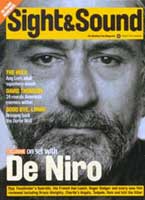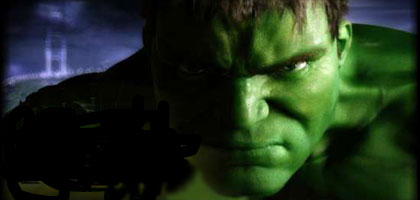
The Rage of Innocence
Film of the Month: Hulk

A sophisticated fairytale with an Oedipal twist, Hulk is unmistakably an Ang Lee film and the best Marvel adaptation to date. By Rob White.
At first glance Ang Lee's mature career (together with his long-time producer and screenwriter James Schamus) divides neatly into two halves. First there are bittersweet family dramas with a growing air of tragedy and disappointment: The Wedding Banquet (1993), Sense and Sensibility (1995) and The Ice Storm (1997). Then there are large-scale, action-packed epics which apparently tail off more and more from tragedy: Ride with the Devil (1999), Crouching Tiger, Hidden Dragon (2000) and now Hulk, his version of Marvel Comics' long-running serial. It would be easy to emphasise the shift in scale from chamber pieces to big-budget blockbusters, and Lee's extraordinary ability seemingly to master any genre, but what's more fascinating is the extent to which the same themes and motifs recur in these films irrespective of their tone or genre.
So if Hulk and The Ice Storm seem in some senses poles apart one a youth-oriented comic-book adaptation, the other a drama drawn from a serious novel it's worth remembering that in the latter the teenage narrator Paul (Tobey Maguire) is an avid Fantastic Four fan. He uses the comic's sci-fi metaphysics ('anti-matter', portals to other dimensions) to try to fathom the tangled intricacies of family life. And it's this experience the adolescent or young adult's often mute search for meaning in the face of a chaotic or malevolent environment that runs through all Lee's films, lending them the coherence of an oeuvre.
This quiet and troubled perplexity is everywhere in Hulk, notably in two extraordinary shots in which characters witness a nuclear explosion and another in which the Hulk, hanging on to a plane in the outer reaches of the atmosphere, gazes into space. What's at stake could be termed the epistemology of innocence, but it's explored without naivety: Lee's films are centrally about innocence, but rather like David Lynch's and much more so than Tim Burton's, they know how fragile a state this is.
The figure of the Hulk, as created in 1962 by Stan Lee and Jack Kirby in strip form and then adapted for US television in 1978 as The Incredible Hulk (with Bill Bixby as the tormented Dr Jekyll figure of Bruce Banner, and the body-builder Lou Ferrigno as his monstrous green-skinned other self), is one of the jokers in the Marvel pack. He (or it) isn't a superhero as such but a rampaging incarnation of the id the embodiment of Bruce's inner beast. Not so in Lee's film. The Hulk's face here fills with curiosity or yearning as often as it contorts with rage. Lee underscores the childlike quality with unmistakable references both to 1933's King Kong (when the Hulk cradles Betty, Bruce's co-worker and ex-girlfriend played by Jennifer Connelly) and to James Whale's 1931 Frankenstein (when he's entranced by a desert landscape). This computer-generated creature is impulsive and vulnerable in a quasi-autistic manner; in this respect he's very like Mikey (Elijah Wood) in The Ice Storm, perilously alone, seeing the world as no one else does. Whereas Bill Bixby's Bruce was crushed and melancholy, doomed always to have to break any emotional tie, he was recognisably a mature man. But the Bruce of Lee's film, played with very little speech or expression by Eric Bana, is a grown-up haunted by the past, still in thrall to childhood traumas. He's chronically introspective, like Elinor (Emma Thompson) in Sense and Sensibility or Jake (Maguire again) in Ride with the Devil.
Hulk brings to the fore the pervasively non-naturalistic, fairytale quality of Lee's work a quality more akin to Dickens or the Brothers Grimm (or indeed Marvel) than any but the darkest Disney productions. Even when, as in The Ice Storm, Lee has worked in a naturalistic mode, there's still that sense of entrapment, particularly domestic entrapment, that underpins so many fairytales. The mise en scne of Hulk makes this palpable: many scenes take place at night or in sealed laboratories and military installations. (When the Hulk escapes captivity and leaps in great bounds across the south-western desert it's accordingly exhilarating.)
The film also foregrounds the fable-like element of Oedipal conflict. Weak, hostile or absent fathers abound in Lee's work, counterpointing the damaged, preoccupied young protagonists. So in Hulk there are two fathers, both authoritarian and more or less mad: Bruce's psychopathic parent David, played with relish by Nick Nolte (looking for all the world like the Unabomber), and Betty's father General 'Thunderbolt' Ross (Sam Elliott), who tells her, "You can trust me to do what I think is right not what you think you want." In one scene the two men glare at each other across a huge hanger like two vicious, mangy lions in a stand-off. In Lee's films nuclear families are combustible and destructive, like those bombs that are numbly witnessed in Hulk. There's a mythical wickedness at large.
Hulk is also pointedly non-naturalistic in its use of CGI, split-screen, inserted graphics shots and computer-designed dissolves. Despite the now-conventional use of ear-splitting sound effects to disguise the 'weightlessness' of CG monsters, this Hulk is never meant to seem anything other than an animated creation, a digital Pinocchio. So tottering are his movements, on occasions it's impossible not to recall Ray Harryhausen's stop-motion work. The artifice is taken to an extreme in the film's culminating battle, when the Hulk takes on a monster able to absorb elemental power who becomes so engorged it's as if he'll grow beyond the Earth's perimeters. This is CGI in the service of surrealism, recalling the expanding animals in Tex Avery's King-Size Canary (1947). Taken together, the various visual devices make up a rattle-bag aesthetic that adds to the overall impression of stylisation.
The paradox of the stylised, fairytale nature of Lee and Schamus' work here and elsewhere is that it's not by any means juvenile. Hulk is richly mythopoeic and sophisticated. For all their considerable entertainment value, the two X-Men outings and Spider-Man (2002) are essentially high-school capers. Hulk is no less enjoyable, but it's in another league of complexity and for this reason is the best Marvel adaptation so far. Lee's career is fast becoming the most interesting in Hollywood.
